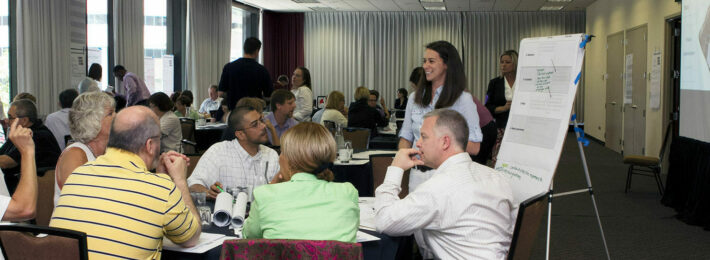
An effective alumni interviews in admissions program can be a win-win-win for alumni, admissions, and college applicants, but it takes some real work to set up a program and continue improving it. Here are the key items you need to know and address from the start.
by Kathy Edersheim (President, Impactrics LLC)
For many colleges and universities, especially the “elite” ones, alumni interviewing of applicants has a long history that is somewhat fraught with the question of purpose, reliability, and feasibility. Some schools have abandoned the system in favor of on-campus or admissions department interviews, while others strive to reach 100% of applicants interviewed.
There are four primary reasons for alumni interviews:
- Promote the school to the Applicant
- Gather additional information about applicants for the admissions team
- Engage alumni
- Disseminate up-to-date information about the institution to alumni
Promote the School
In today’s competitive education market, high school seniors apply to 10 or more colleges. How will you make your school stand out? How will you convince the applicant of your institution’s suitability for them? The interview provides an opportunity for the alum to represent the school and convince the applicant of its excellence. In fact, the alumni interview is a great message in and of itself – it shows dedication and support for the school. A good interviewer will both answer the applicant’s questions and showcase the school.
Gather Information – Learn More About the Applicant
At many schools, the interview has become primarily about providing information to the applicant, with some consideration of the interviewer report about the applicant, and a side benefit of alumni engagement. If the interview system is well-managed, the admissions team should get valuable information about the applicant that contributes to the admissions process. Having corroboration of application information and additional input is particularly valuable in light of “Operation Varsity Blues” and general concerns about the application process. Imagine if athletic recruits had alumni interviews – what if a soccer recruit talked all about her art portfolio or a tennis recruit never mentioned a tournament?
Engage Alumni
Because of the numbers of applicants for most schools today, the interview program requires significant participation of alumni. This means that for many schools, the interview program directly engages more alumni than any other single campus effort. Having an alumni-applicant interviewing program provides a meaningful interaction for alumni with the next generation of students. As alumni become interested in the students, they also become more supportive of them and of the school.
Disseminate News
In order to have an effective interview program, the alumni must be well-informed about the institution today and be trained in how to conduct the interview and to submit a report. The communications to the interviewing alumni provide an excellent opportunity to showcase life on campus and share news of accomplishments. And those communications can be sent to the rest of the alumni as well, although the open and read rate may be somewhat lower.
The Keys to an Alumni Admissions Interview Program
Whether you have an alumni interview program in place that you want to improve or whether you want to implement a new program, here are key components of the system – some of which have to be done in parallel:
- If you are starting a program, set a target date for implementing it, based on the percentage of applicants that should have alumni interviews. Some applicants may have on-campus interviews. Anticipate a phase-in period to build the roster of interviewers. (If you have an existing program, do you have a target percentage for applicants interviewed?)
- Assign program leadership to someone in admissions with a liaison in the alumni relations office because you share the constituency. Alumni relations has the contact info; admissions has the engagement program.
- Based on your alumni organization and institutional priorities, decide if the program will be volunteer-driven with regional leadership or campus-driven for communications and interview assignments. A volunteer-driven effort requires strong regional leadership. In either case, you should take advantage of admissions software that helps with assigning and tracking interviews. If you allow or encourage virtual interviews, it might be easier to have centralized assignments.
- Calculate and plan for the impact on your application process, such as longer reading and/or group review time.
- Determine qualifications, if any, for the interviewers, such as recent campus visits, completion of training, availability to give a certain number of interviews (for experience and consistency), or willingness to use virtual communication technology. Decide if you want interviews conducted by one alum or team interviews, which requires more volunteers (and coordination).
- Develop the annual calendar for the program to ensure that interviews are timely. Each year, the program needs to be announced, and alumni need to sign up (or affirm continuing participation). Then the alumni need to have some training, receive applications, contact applicants, conduct the interviews, write the report, and submit it in time for admissions team review. And that is twice if there is Early Decision or Early Action, three times if there is ED 2.
- When you have the calendar, develop the communications plan that goes with it. The Alumni Relations team can be very helpful in thinking about how it should be presented to the alumni and how to keep alumni excited over time. Practically speaking, create the templates and write the emails in advance, as much as possible. Include a thank you email or card with statistics such as total candidates, total interviews, and admission statistics at the end of the admissions cycle. Also, be prepared for a lot of interaction with the alumni, especially at the beginning. The program’s leader needs to be a good “people person”!
- The interview program also needs to be communicated to applicants and properly included on the application. Prepare the communications for applicants and revise the application form for internal tracking of interview information.
- Prepare the guidelines and training for the alumni interviewers. Many schools provide webinars describing the process and offering “best practices” for both interviewing and writing the reports. Include some DOs and DON’Ts in bullet form for the most important points, such as where to hold the interview (not at home) and the expected length (usually about an hour but not more than 90 minutes).
- Research and decide on the technology for the program. There is usually an interviewer webpage and portal into the report submission system. Depending on the decision about interviewer-applicant assignment methodology, there is technology to support it. Most schools allow virtual interviews, which can be conducted through a dedicated platform or via Skype, Zoom, etc., based on alumni-applicant agreement. Make sure that the interviewer tracking system “talks” to the institutional CRM.
- Working with the alumni relations team, consider how to recognize and motivate interviewers. One option is to develop a recognition system that rewards alumni for most interviews, most years interviewing, most virtual interviews, most in-person interviews, etc.
- And, every year, evaluate the program to determine how it can be improved with more informed alumni, a higher interview rate, more interviewers, and more useful information.
Yes, an alumni-applicant interviewing program is “resource-intensive”; it is an investment. Some schools don’t have the resources. Or it might not be relevant in a test-based admissions process, as in many countries. For those who do choose to have a program, it can provide significant value by achieving deep and meaningful engagement for alumni, encouragement for applicants, and strengthening the admissions process. It is a win-win-win.
Image Credit: The photo at the top of the page is by Spencer Russell on Unsplash.
More Articles from Kathy Edersheim

Alumni Affinity Groups: How One University Formed a Highly Successful Organization
How does an alumni affinity group get started and, perhaps more importantly, what makes it sustainable beyond the initial excitement?

How to Engage International Alumni Effectively
Markets are global, education is global, and so alumni relations should be global, too.

From Information Overload to Collaborative Learning: Why Higher Ed Needs Higher Tech
Our campus communities — students, faculty, staff, alumni — deal with information overload across many platforms and apps. Isn’t it time we brought campus communication and learning into one high-tech ecosystem?

